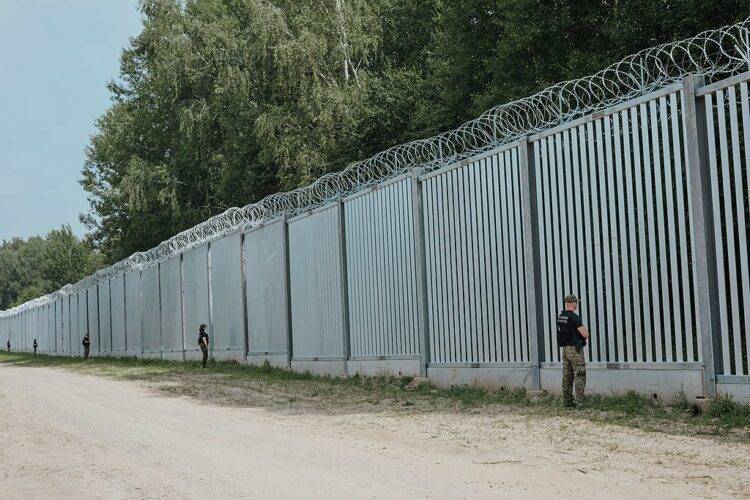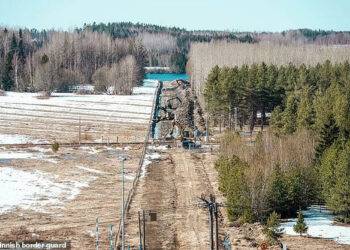In a decisive move to enhance national security, Polish Prime Minister Donald Tusk, during a press conference with the Finnish Prime Minister, announced plans for a rapid modernization of the barrier along the Poland-Belarus border. This initiative underscores Poland’s commitment to safeguarding its borders in light of growing geopolitical tensions in the region.
Tusk emphasized the importance of a coordinated approach to border security, highlighting the necessity for Poland, Finland, and the Baltic states to share responsibility in fortifying their borders against Russia and Belarus. “If the borders with Russia and Belarus are to be tight, Finland and Poland, along with the Baltic countries, must take responsibility. There can be no weak links,” Tusk stated.
The border barrier has been a topic of significant political and social debate within Poland. Initially sparked by concerns over unregulated migration and security threats, the discourse intensified during the election campaign, with opposing views on the barrier’s existence and its role in controlling immigration from Belarus.
Tusk addressed the controversy surrounding the barrier, countering claims made during the election campaign about its dismantlement. He clarified that the barrier’s construction is essential for Poland’s security, describing previous claims as “one of the most symbolic lies of PiS.” This statement aims to set the record straight and focus on the practical aspects of border security.
Previously, Poland completed the construction of a new steel wall along its border with Belarus to curb the flow of undocumented asylum seekers. This barrier, intended to keep out people fleeing conflict and poverty from the Middle East and Africa, was a response to the Belarusian government encouraging migrants to try entering the European Union. The wall, which cost 353 million euros ($407 million), is 5.5 meters (18 feet) high and spans 186 kilometers (115 miles).
The construction of barriers and implementation of strict border controls have been part of Poland’s efforts to manage uncontrolled migration and address security concerns. These measures include erecting walls and fences along the frontier with Belarus and introducing sanctions that limit border crossings
The hybrid warfare against Poland, involving Russia’s encouragement of illegal migrants to cross the Polish-Belarusian border, marks a complex security challenge for Warsaw. This strategy began to intensify in 2021, amid broader geopolitical tensions, where Belarus, with suspected backing from Moscow, seemingly facilitated the movement of migrants from the Middle East and Africa towards the EU’s borders, particularly Poland’s. At its peak, this orchestrated movement led to a significant surge in illegal border crossings, putting immense pressure on Polish border security and EU’s external frontiers. In response, Poland undertook the construction of a robust barrier along its border with Belarus. This physical deterrent significantly contributed to curbing the flow of undocumented migrants. By enhancing surveillance and physical barriers, Poland managed to drastically reduce the numbers of illegal crossings, showcasing the effectiveness of infrastructural measures in the face of hybrid threats
The government had previously informed Business Insider Polska of its intentions to develop the barrier further, including the construction of an electronic barrier along the water sections of the border with Belarus. This project, extending over 219 kilometers, is part of Poland’s broader strategy to enhance its defensive infrastructure, with funding from the EU.
Tusk’s announcement also signals a broader engagement with European Union mechanisms for border security, illustrating how Poland is leveraging EU resources to address shared security challenges. This approach not only strengthens Poland’s borders but also contributes to the collective security of the EU’s external frontiers.
As Poland embarks on this ambitious project to modernize its border barrier with Belarus, the initiative represents a critical component of the country’s comprehensive security strategy. By reinforcing its borders, Poland aims to protect its sovereignty and maintain stability in the face of external pressures, ensuring the safety of its citizens and the integrity of the European Union’s eastern boundary.
The modernization of the Poland-Belarus border barrier marks a significant step in Poland’s efforts to enhance national and regional security. As geopolitical dynamics continue to evolve, Poland’s proactive measures underscore the importance of preparedness, collaboration, and resilience in safeguarding the nation and its European partners.
- Follow us on X (Twitter) to stay up to date with News from Poland.


















